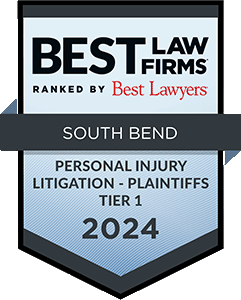 There are many benefits to having an attorney represent your interests during a legal claim for compensation after an accident. Aside from potentially improving your odds of recovering more compensation, hiring an attorney benefits you because of attorney-client privilege. The attorney-client privilege means many things, but the main point is confidentiality.
There are many benefits to having an attorney represent your interests during a legal claim for compensation after an accident. Aside from potentially improving your odds of recovering more compensation, hiring an attorney benefits you because of attorney-client privilege. The attorney-client privilege means many things, but the main point is confidentiality.
Our personal injury attorneys in South Bend are prepared to review the facts of your claim during a free consultation to see how we may be able to help you maximize your compensation.
Below, our attorneys discuss what attorney-client privilege means for personal injury victims.
Definition of Attorney-Client Privilege
Attorney-client privilege requires communication between you and your attorney to be kept private if the communication concerns your case. This helps to encourage open and honest communication between the attorney and his or her client without fear of these communications being accessible to either the public or opposing counsel.
Attorney-client privilege is asserted when a legal demand by the opposing party is made. For example, during the discovery process of a case, any privileged information is not legally discoverable.
It is important to point out attorney-client privilege does not exist until there is an attorney-client relationship.
When is the Attorney-Client Relationship Created?
Typically, this relationship is created when the client agrees to work with the attorney and the attorney agrees to take the case. This arrangement is usually explicitly stated in an engagement letter or fee contract. An oral agreement may also create this relationship.
If you talk to your attorney about your case and have an expectation for the conversation to remain private, the attorney cannot discuss it with others without your permission. Privileged communication includes any oral or written conversations about the case, including:
- Texts
- Emails
- Phone calls
- Voice messages
Privileged information may also include non-written or non-verbal communication, such as a nod in agreement or the shake of one’s head.
Can Attorney-Client Privilege Be Waived?
Attorney-client privilege can be thought of as the client’s privilege. That means the client is typically the only one who can waive the privilege.
Generally, clients only waive their privilege when there is the need to have a third party present during some proceeding. For example, a conversation between an injury victim’s doctor and the attorney may require the waiving of attorney-client privilege to avoid confusion or a lack of understanding about your required treatment.
What Are the Exceptions to Attorney-Client Privilege?
Although the attorney-client privilege covers most communications between the injured victim and his or her legal representative, there are still some exceptions. For example, if the client admits to his or her attorney an intention to commit fraud, or an act of fraud related to the current claim, the attorney may be legally obligated to disclose this information to the appropriate authorities.
Laws regarding privileged attorney-client communications may differ from state to state. Therefore, it is important to discuss any concerns you may have about communication your attorney is legally required to keep confidential before disclosing something you believe may hurt your claim.
It is important to note that disclosure of preexisting conditions, injuries or prior accidents is not considered fraudulent intent. Instead, this is important information to disclose to your attorney early on in your case to help your attorney build a strong case with knowledge of all the facts.
Talk to an Experienced Lawyer. Call Today
Our experienced attorneys are prepared to review all the facts of your case in a free consultation and discuss how we may be able to help you. Unlike the insurance company, our goal is the same as yours: recovering maximum compensation.
There are no fees while we work on your case, and you do not owe us anything unless we win.
Call us today at (844) 678-1800.











